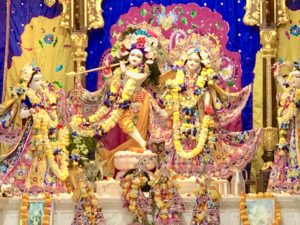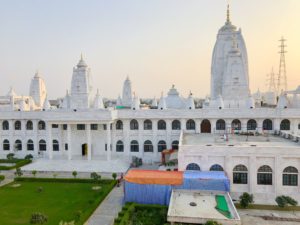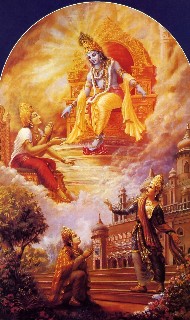
(Kadamba Kanana Swami, 27 June 2015, New York, USA, Bhagavad-gita 9.33)
Question: You mentioned the shooting incident. I am curious to know how this specific experience affected you in a personal way, if it is not too personal to share?
I will keep it simple. I do not want to speak about the material side of it, you know, the conspiracy, who pulled the trigger and all that. That is for the tabloid newspaper so we leave that out. I could see that the ultimate cause of all this was Krsna, so I did not get into the mood of who did it! It was Krsna who sent this to me.
It was not just a freak incident. There were people who were trying to get rid of me and that was really what was going on. And I sort of thought, ‘What is wrong with me that people want to get rid of me? Why is that? What did I do?’ I started thinking about that. Of course, whoever resorted to means of shooting someone in the back is not a person of good character. That is quite obvious. I might possibly call him a bit crazy; someone who goes to such an extent. But still, what did I do to agitate this crazy man to that point!? I had to ask that question, ‘What is it in me that caused this?’
For a long time, I had been the leader of our temple in Vrindavan; I was in charge for a long time. Everyone who needed to buy something had to come through me and I had got used to it; I had all the strings and I had gotten used to it. I tried to be reasonable. I thought that was how I should be. I thought that I should be reasonable with people. So I tried to be kind of what I thought is reasonable, to be what is commonly accepted to be reasonable. But, you know, what is your criteria for what is reasonable!? It is not so easy to determine.
So I attempted to be reasonable with everyone because I was controlling so many facilities. People would come all day and ask, “Can I use this, can I have that or can I do this?” And I had to decide. So I tried to be reasonable but it was by my criteria and maybe it was not always reasonable to others and people were left dissatisfied and I could see that I needed to change. I had to stop the impersonal attitude and become more personal and more sensitive to people. You cannot just leave some one completely dissatisfied to the point where it just begins to fester and like ferment inside. I could see that I had to change and become more sensitive and try to satisfy everyone.
So I changed, something changed. I am more conscious of it and trying to be more conscious of it. So even when someone wants something crazy, I try to deal with it in a personal way whereas before, I would have just said no. At the same time, it forced me to be humble for a while. I got reduced by the whole experience – I lost my power, lost all power and I could barely lift my arm for two years before I could function. So I was reduced, thrown back on myself and it also gave me some time to sort of look more at what was inside.
Was life so much about all the external achievements!? You know, your identity becomes so mixed with your achievements – I had done all these things therefore I had control of all this and that. Then I had nothing left – no money, no car, no energy and just reduced. I have always been someone with lots of energy so in whatever I do, I just throw all my energy at it. So if you take everything away, no problem, just with my energy I will be back, I am that kind of a person, you know, a high energy person. But at that time, even my high energy was gone. I had nothing except what was inside, that was all.
So I was forced to have a real good look at what was inside; the love I had inside, and I realised that it was not that much. It was less than I thought I had; I did not have that much. So it forced me to deeply reflect, which was beneficial. I would not be here and I would not be doing what I am doing now if that incident did not happen. Now I try to live a life not for myself but for other people, and give as much as I can, and I do not think I would have been able to do that in the same spirit as I am doing it now, without having gone through that experience. Anyway a very serious aspect; a very serious topic…
The article " Lessons in life " was published on KKSBlog.

 By the Admin
By the Admin

 By Bhakta Hardik Kathuria
By Bhakta Hardik Kathuria
 Srila Prabhupada wanted ISKCON’s temples to be centers of intensive devotional service, especially in the form of the five main practices essential to bhakti-yoga: chanting the holy name, hearing Srimad-Bhagavatam, worshiping the Deity, serving the Vaishnavas, and living in a holy place. He also wanted the temples to serve as hubs for outreach, where the spiritual lives of our guests could blossom. While some of our temples are meeting these objectives, many are struggling. This initiative examines Srila Prabhupada’s instructions about temples and applies a “best practices” and mentorship approach to helping all ISKCON’s temples better fulfill their purpose.
Srila Prabhupada wanted ISKCON’s temples to be centers of intensive devotional service, especially in the form of the five main practices essential to bhakti-yoga: chanting the holy name, hearing Srimad-Bhagavatam, worshiping the Deity, serving the Vaishnavas, and living in a holy place. He also wanted the temples to serve as hubs for outreach, where the spiritual lives of our guests could blossom. While some of our temples are meeting these objectives, many are struggling. This initiative examines Srila Prabhupada’s instructions about temples and applies a “best practices” and mentorship approach to helping all ISKCON’s temples better fulfill their purpose.


 By Jaya Gopal das
By Jaya Gopal das






















 This year in the island of Bali, Lord Nityananda showered His causeless mercy to the devotees. For the second time this year the grand Cida dahi festival was held at the Merta Sari beach. This program was not planned however. HH Subhag Swami arrived in Bali a few days prior to the festival and spontaneously commented, ‘We should have a Cida dahi festival!’ The local devotees took this instruction seriously and as a result within a short span of only three days was this festival arranged.
This year in the island of Bali, Lord Nityananda showered His causeless mercy to the devotees. For the second time this year the grand Cida dahi festival was held at the Merta Sari beach. This program was not planned however. HH Subhag Swami arrived in Bali a few days prior to the festival and spontaneously commented, ‘We should have a Cida dahi festival!’ The local devotees took this instruction seriously and as a result within a short span of only three days was this festival arranged.





 By Satyaraja Dasa
By Satyaraja Dasa











